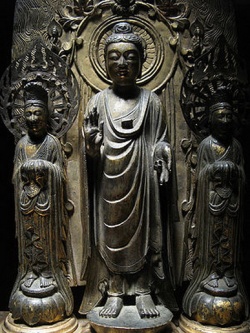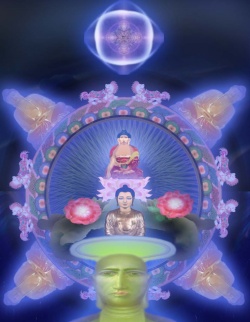Difference between revisions of "Tonglen or Bodhicitta meditation"
m (Text replacement - "end" to "end") |
m (Text replacement - "countless" to "countless") |
||
| Line 7: | Line 7: | ||
In practice, [[Bodhicitta]] begins with a mature and responsible [[attitude]] towards others and deepens from there as you come truly to understand what moves others, and are [[able]] to give more. It is not just a [[meditation]] method. [[Bodhicitta]] can be generated effectively only in the context of actual relationships. However, [[meditation]] is a helpful part of its [[development]] because its method generates an intense [[awareness]] of the quality of all our relationships, drawing to our [[attention]] the fact that you are in [[constant]] relationship with the whole of [[nature]] with all its diverse {{Wiki|life forms}}. So what you do, say and think eventually affects them all, just as their [[lives]] also, indirectly, affect you as well. Through this [[meditation]] you therefore immerse yourself in your connection with the [[reality]] of others’ [[existence]] and generate true [[compassion]] for them. | In practice, [[Bodhicitta]] begins with a mature and responsible [[attitude]] towards others and deepens from there as you come truly to understand what moves others, and are [[able]] to give more. It is not just a [[meditation]] method. [[Bodhicitta]] can be generated effectively only in the context of actual relationships. However, [[meditation]] is a helpful part of its [[development]] because its method generates an intense [[awareness]] of the quality of all our relationships, drawing to our [[attention]] the fact that you are in [[constant]] relationship with the whole of [[nature]] with all its diverse {{Wiki|life forms}}. So what you do, say and think eventually affects them all, just as their [[lives]] also, indirectly, affect you as well. Through this [[meditation]] you therefore immerse yourself in your connection with the [[reality]] of others’ [[existence]] and generate true [[compassion]] for them. | ||
| − | The method is first to make [[contact]], with a [[loving]] [[mind]], with the billions of other [[unenlightened beings]] surrounding you, [[cultivating]] {{Wiki|empathy}} with them. This is cultivated by recollecting that, to the extent they do not know how to overcome their own [[negative emotions]], people’s [[lives]] are relatively, if not extremely, unsatisfying. Realise this by looking with [[mindfulness]] and [[love]] into your own {{Wiki|behaviour}}, and [[acknowledging]] the influence on you of all these [[beings]], taking {{Wiki|responsibility}} for your influence on them, now and in the {{Wiki|future}}. Take this step not in some {{Wiki|theoretical}} way, but through generating a deeply felt [[love]] for them. Indeed, every part of the practice – making [[contact]], {{Wiki|reflecting}} on their situation, [[cultivating]] {{Wiki|empathy}}, [[acknowledging]] their influence and taking {{Wiki|responsibility}} for you own – is done through generating [[loving kindness]] or [[metta]]. Take [[courage]], too, from the inspiring {{Wiki|individuals}} who make up the age-old [[Dharma]] [[practice tradition]]; recollect that | + | The method is first to make [[contact]], with a [[loving]] [[mind]], with the billions of other [[unenlightened beings]] surrounding you, [[cultivating]] {{Wiki|empathy}} with them. This is cultivated by recollecting that, to the extent they do not know how to overcome their own [[negative emotions]], people’s [[lives]] are relatively, if not extremely, unsatisfying. Realise this by looking with [[mindfulness]] and [[love]] into your own {{Wiki|behaviour}}, and [[acknowledging]] the influence on you of all these [[beings]], taking {{Wiki|responsibility}} for your influence on them, now and in the {{Wiki|future}}. Take this step not in some {{Wiki|theoretical}} way, but through generating a deeply felt [[love]] for them. Indeed, every part of the practice – making [[contact]], {{Wiki|reflecting}} on their situation, [[cultivating]] {{Wiki|empathy}}, [[acknowledging]] their influence and taking {{Wiki|responsibility}} for you own – is done through generating [[loving kindness]] or [[metta]]. Take [[courage]], too, from the inspiring {{Wiki|individuals}} who make up the age-old [[Dharma]] [[practice tradition]]; recollect that countless practitioners have cultivated [[Bodhicitta]] to completion and gained full [[Enlightenment]]. |
This particular [[Bodhicitta]] practice comes from Indo-Tibetan [[Buddhism]] and is often referred to as [[Tong Len]]. | This particular [[Bodhicitta]] practice comes from Indo-Tibetan [[Buddhism]] and is often referred to as [[Tong Len]]. | ||
Reflect first that the aim of [[Bodhicitta]] is to [[transform]] all [[activity]] into the [[Path]] of [[Enlightenment]]. You develop a completely new [[vision]] of [[existence]] by {{Wiki|reflecting}} with strong [[compassion]] on the [[lives]] of other [[beings]], with their vast range of [[fortunate]] and unfortunate [[existences]]. However [[fortunate]] or privileged they are, all are vulnerable, just as you, or your own all-too-human [[parents]], are. All of us do all kinds of regrettable things and thereby get mired in all kinds of stresses and difficulties. As you reflect in this way, with [[metta]] and [[compassion]], there will arise some kind of hopeless [[desire]] to do something for ‘them’ (which includes you ). With this [[sense]] of longing, repeat the following [[prayer]] (internally, to yourself ) many times ([[traditionally]], one practises regularly over weeks and months until one hundred thousand repetitions have been made). | Reflect first that the aim of [[Bodhicitta]] is to [[transform]] all [[activity]] into the [[Path]] of [[Enlightenment]]. You develop a completely new [[vision]] of [[existence]] by {{Wiki|reflecting}} with strong [[compassion]] on the [[lives]] of other [[beings]], with their vast range of [[fortunate]] and unfortunate [[existences]]. However [[fortunate]] or privileged they are, all are vulnerable, just as you, or your own all-too-human [[parents]], are. All of us do all kinds of regrettable things and thereby get mired in all kinds of stresses and difficulties. As you reflect in this way, with [[metta]] and [[compassion]], there will arise some kind of hopeless [[desire]] to do something for ‘them’ (which includes you ). With this [[sense]] of longing, repeat the following [[prayer]] (internally, to yourself ) many times ([[traditionally]], one practises regularly over weeks and months until one hundred thousand repetitions have been made). | ||
Latest revision as of 15:05, 31 December 2014
Imaginatively exchanging ourselves with others, or putting ourselves in another’s place, is an important Mahayana Buddhist practice especially associated with the teacher Shantideva. Shantideva felt that the Buddha’s motivation had not been to end his own suffering, but to help all beings to do that. From the viewpoint he made famous, Dharma practice is really about cultivating Bodhicitta, the attitude of an awakened being. Insight practice cultivates seeing the real nature of self and world; the real nature of the self being that it is completely unfixed. This means you can change, and the main obstacle is your own selfishness. So can you reverse that tendency in your relations with others and go beyond valuing yourself over them? That would accord with the approach to insight found in the Brahma Vihara practices.
The Pali and Sanskrit word bodhi means awakening; citta means heart, mood, mind state or attitude. Hence Bodhi-citta is the essence of the Awakened or Enlightened mind. At a more ordinary level it is the love that arises for others when you know, out of deep experience of suffering and joy, that what everyone really needs is spiritual awakening. Though it is a response to the unsatisfactoriness of life, Bodhicitta is not pity, nor does it involve a sense of superiority. It sees, through insight, that others are important than you are; it is the very essence of friendship and love.
In practice, Bodhicitta begins with a mature and responsible attitude towards others and deepens from there as you come truly to understand what moves others, and are able to give more. It is not just a meditation method. Bodhicitta can be generated effectively only in the context of actual relationships. However, meditation is a helpful part of its development because its method generates an intense awareness of the quality of all our relationships, drawing to our attention the fact that you are in constant relationship with the whole of nature with all its diverse life forms. So what you do, say and think eventually affects them all, just as their lives also, indirectly, affect you as well. Through this meditation you therefore immerse yourself in your connection with the reality of others’ existence and generate true compassion for them.
The method is first to make contact, with a loving mind, with the billions of other unenlightened beings surrounding you, cultivating empathy with them. This is cultivated by recollecting that, to the extent they do not know how to overcome their own negative emotions, people’s lives are relatively, if not extremely, unsatisfying. Realise this by looking with mindfulness and love into your own behaviour, and acknowledging the influence on you of all these beings, taking responsibility for your influence on them, now and in the future. Take this step not in some theoretical way, but through generating a deeply felt love for them. Indeed, every part of the practice – making contact, reflecting on their situation, cultivating empathy, acknowledging their influence and taking responsibility for you own – is done through generating loving kindness or metta. Take courage, too, from the inspiring individuals who make up the age-old Dharma practice tradition; recollect that countless practitioners have cultivated Bodhicitta to completion and gained full Enlightenment.
This particular Bodhicitta practice comes from Indo-Tibetan Buddhism and is often referred to as Tong Len.
Reflect first that the aim of Bodhicitta is to transform all activity into the Path of Enlightenment. You develop a completely new vision of existence by reflecting with strong compassion on the lives of other beings, with their vast range of fortunate and unfortunate existences. However fortunate or privileged they are, all are vulnerable, just as you, or your own all-too-human parents, are. All of us do all kinds of regrettable things and thereby get mired in all kinds of stresses and difficulties. As you reflect in this way, with metta and compassion, there will arise some kind of hopeless desire to do something for ‘them’ (which includes you ). With this sense of longing, repeat the following prayer (internally, to yourself ) many times (traditionally, one practises regularly over weeks and months until one hundred thousand repetitions have been made).
'Beings who are one's own mothers and fathers wander in the Samsara and with unbearable longing we all produce the unbearable longing to become a Buddha.'
The words themselves do not particularly matter; this is a translation of a traditional verse. You need to get to the point with the repetition where you get fully immersed in the meaning and the vastness of its implications. See that it’s true that entanglement in samsara makes for our ruin, that the only effective solution is for all beings to practise the path to awakening – and that this, therefore, has always been our most heartfelt desire. When you connect to this fully, the feeling becomes so unbearably strong that it may burst out in new, unexpected ways.
Once you have connected with the desire, which is the Bodhicitta, you are ready to go on to the next phase: linking it with the breathing. It will probably help to keep the connection with the feeling of Bodhicitta if you continue the verse repetition, for now at least.
You need to connect with what in traditional Buddhism are called ‘roots of goodness’. People are basically good. Trust in their basic goodness, beyond any mixed feelings you might have about that; and imagine that your own goodness, such as it is (there is no need for pretence, it is naturally and spontaneously true) mixes with the outgoing breath and, with a soft pearly light like moonlight, penetrates the whole world, conferring happiness on all beings.
This imaginatively represents the prayer; it is a kind of dramatisation of what you’d really like to happen. Just let go into the outward breath, ignoring any doubting voices that say this is peculiar and irrational. It is because this meditation method is non-rational – is beyond mere good reasons – that it can have such powerfully positive effects. Simply go along with the feeling and give the practice your all, all the while refining the overwhelming desire for the wellbeing of others.
Then on the incoming breath, imagine all beings’ obstacles to awakening – their negative emotions and views – assuming a dark, shadowy appearance and coming right into your own body, where they are purified by your good qualities. You shouldn’t take any of this literally – no one could literally assume the results of others’ actions – but the imagery offers a powerful way to engage with the reality of others and the many terrible problems that exist. It should feel like facing the real world.
One should reflect [and say]: 'May all beings enjoy happiness and the cause of happiness! Whatever freedom from suffering they enjoy may it never come to an end! May their minds dwell in the immeasurable equanimity which has neither near nor far, attraction nor repulsion!'
This one should say and reflect upon many times.
Once the Bodhicitta method is familiar it can become a vehicle for all kinds of reflections, insights and transformations of attitude. The table below shows a number of ways that our breathing can channel awareness of ourselves and others together with love and compassion, giving and receiving.
Receive (breathe in)
Give (breathe out)
1
My experience of the incoming breath
My experience of the outgoing breath
Myself as experienced in the present moment, taken in with the in-breath
My response to my present experience,
let out with the out-breath
2
The presence of all others and their influence on me, with the in-breath
My influence on others, with the out-breath
The fact of others’ suffering, with the in-breath
My response to others’ suffering, with the out-breath
3
The fact of others’ good influence, with the in-breath


